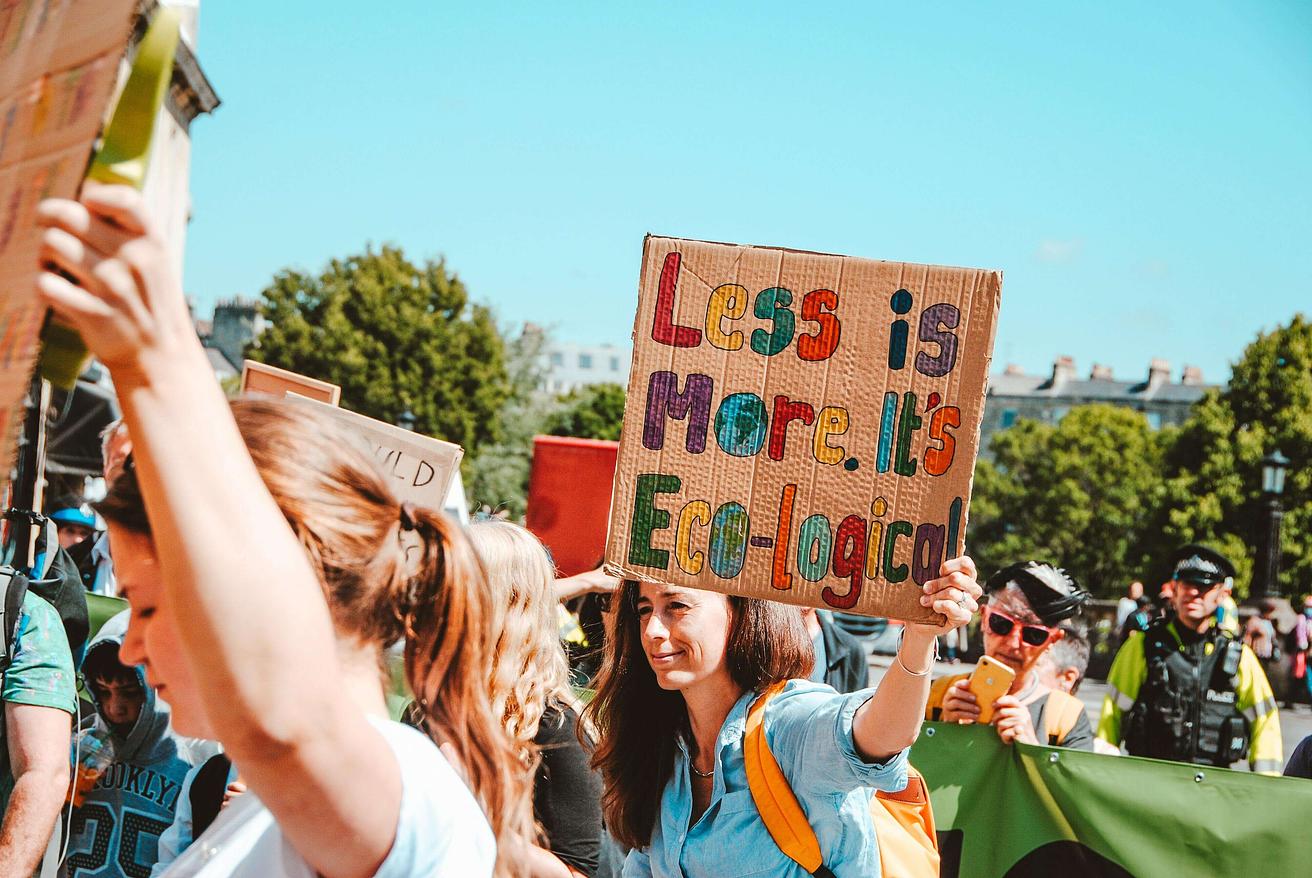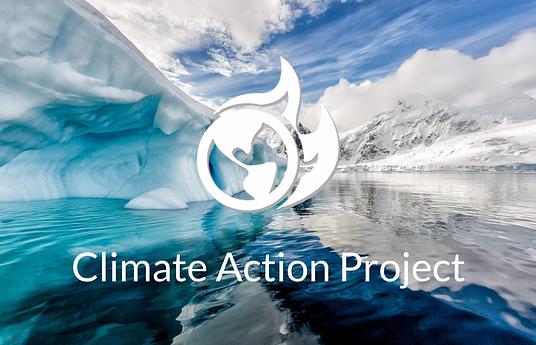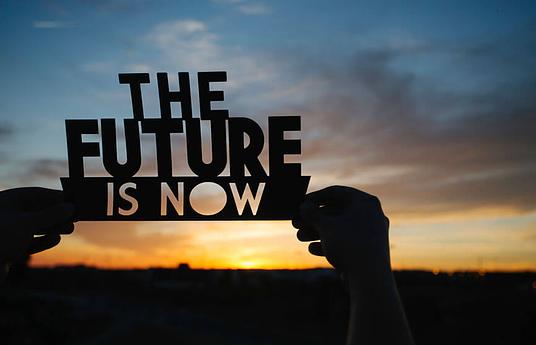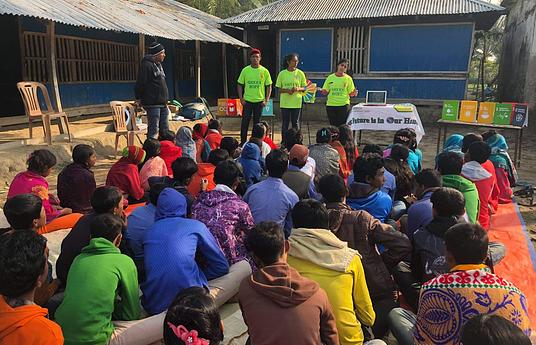The theme of this year’s Earth Day is investing in our planet. When we think about investing in our planet, this naturally aligns with investing in our future and the future of our young people.
Young people are demanding new laws and legislation to be put in place by our governments. They have done this through protests, demonstrations and calls for change on social media. Their message is clear, we can no longer afford to live in a world that promotes overconsumption and we must convert to more sustainable practices. With young people at the forefront of this movement, it is becoming increasingly clear the importance of having every stakeholder involved and invested.
This Earth Day, we asked HundrED Youth Ambassadors Isabel, a 16-year-old from Bahrain; Alexandra Zandy, a 19-year old college student from the United States; and Olivia a 14-year-old from Australia their feelings about climate change and the education they are receiving around how to create a more sustainable future for us all. They shared their thoughts and feelings about climate change.
1. Let’s talk climate change - How do you feel when you read, see, and hear news on the state of the climate?
Once on the news, I heard the term 'climate anxiety', but that isn't right... Looking at articles and statistics, or simply looking outside, I know that every ounce of my terror is justified.
Isabel: I feel very overwhelmed when I read the news about the state of the climate. It’s tragic to see such an immense problem affecting our environment in the present, a problem that is likely to continue in the future. On the other hand, I can’t help but feel a little guilty: climate change is caused by human behaviour and human demands - it is us that amplifies the Earth’s natural greenhouse effect.
Olivia: The discussion of climate change elicits a primal reaction in me, conjuring images of waist-high floodwaters and smoky red skies. Once on the news, I heard the term 'climate anxiety', but that isn't right... Looking at articles and statistics, or simply looking outside, I know that every ounce of my terror is justified. So whenever I try to forget my fear, I'm left wondering why I should, and whether I even have that luxury.
There is less recognition from those who are poor, who are disabled, who are women, and who are from the Global South which is harmful when climate change has had disproportionately negative effects on these communities.
Alexandra Zandy: When I read news on the state of the climate, it’s often very disheartening. First, it’s just sad to read about more damaging natural disasters and how ecosystems are dying because of our collective effort. It’s often hard to separate if it’s the individual who’s making such a harmful impact or the capitalist nature of companies that is causing this much damage. It can often feel very futile when it seems like there’s not much you can do to reverse this change or that the individual actions you take every day are not making a difference in the grand scheme of things. There’s also not much diversity in the voices of those who are combating climate change in their own communities. There is less recognition from those who are poor, who are disabled, who are women, and who are from the Global South which is harmful when climate change has had disproportionately negative effects on these communities.
2. Do you think that your school is talking about the environment enough?
Isabel: I believe the encouragement in my school, regarding combating climate change, has grown for the better. in my school, we now have ‘EcoLeaders’ and often have intriguing Enrichment sessions which allow us to develop our knowledge and discuss climate change, the consequences and how to minimise our contribution to global warming. However, I believe there is always a way to do more; changing to solar power or perhaps even spending a day in school without light are innovations that will leave a lasting impression on all generations.
I believe projects like these in school environments are especially beneficial and useful as the youth hold the key to a more sustainable future. For example, movements in education like United World College which go above and beyond, “making education a force to unite people, nations and cultures for peace and a sustainable future,” are truly eye-opening!
I believe there is always a way to do more; changing to solar power or perhaps even spending a day in school without light are innovations that will leave a lasting impression on all generations.
Olivia: In Australia, climate change is a compulsory aspect of our geography curriculum. We take a step back, and analyse what all of this really means for us, and how we can help. When our enemies are the forces of nature, it's so easy to become overwhelmed and try to shut ourselves off from the news of the outside world. But by being guided through the data - the why and the when and the how - we can stop seeing the problem as victims and start viewing it as scientists. It's then that we're able to begin searching for real solutions.
I am glad to see the inclusion of environmental health and identifying climate change as a factor in living a healthy life as part of my public health classes.
Alexandra Zandy: I study public health at Johns Hopkins University, so the topic of climate change comes up often when we discuss the impact of social determinants of health. Up until recently, climate change was not considered a social determinant of health. More recently, it has been considered a large driver of how healthy of a life you can live. I am glad to see the inclusion of environmental health and identifying climate change as a factor in living a healthy life as part of my public health classes. In co-curricular activities, there are always plenty of zero waste and recycling campaigns run by students and faculty that I participate in.
3. What message would you like to share with the global community this Earth Day?
Isabel: I would like to remind the global community that every action counts - whether it is small or grandiose! Simple choices and actions like conserving energy, purchasing eco-friendly products and refusing plastic bags go a long way. Healthy planet, happy people.
We, the people, hold the power.
Olivia: We, the people, hold the power. Sometimes, it can seem like the entire world is beholden to some chamber of dignitaries in the sky, but their strength is only a construct. When push comes to shove, this planet is home to seven billion people - loud, powerful, angry people - just like you and me. Coming together, pooling our money and our passion, we could truly change the world.
Alexandra Zandy: To reverse climate change, it’s going to take all of us. Make sure to acknowledge and recognize communities that are usually marginalized in the climate change response.
We are grateful to Isabel, Olivia & Alexandra Zandy for sharing their thoughts and feelings on the climate crisis and the education they are receiving.
Climate education being prioritized at schools as well as a global mindset of collaboration to slow down the effects of climate change, as Olivia said ‘could change the world’.
This Earth day “we need to act (boldly), innovate (broadly), and implement (equitably).” From our side at HundrED, we will continue to use our platform to highlight the voice of the inspiring young people in our community and share innovations relating to climate education so that every child is equipped with the knowledge and resources they need whether it be tools to help with climate anxiety or actionable ways they can be part of the solution.
If you have an innovation related to the topic of Climate Education, we would love to know! Submit your innovation to be considered for the Global Collection 2023 here.



